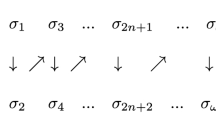Abstract
The failed criterion of logical truth proposed by Carnap in the Logical Syntax of Language was based on the determinateness of all logical and mathematical statements. It is related to a conception which is independent of the specifics of the system of the Syntax, hints of which occur elsewhere in Carnap’s writings, and those of others. What is essential is the idea that the logical terms are invariant under reinterpretation of the empirical terms, and are therefore semantically determinate. A certain objection to Carnap’s version of the invariance conception has been repeated several times in the literature. It is based on Gödel incompleteness, which is puzzling, since Carnap’s Syntax is otherwise quite careful to take account of Gödel. We show here that, in fact, the objection is invalid and is based on a confusion about determinacy. Sorting this out is worthwhile not only for the purpose of better understanding Carnap’s thinking in the Syntax, though. The invariance conception is also related to recent work in the philosophy of logic regarding “logicality”—the characterization of logical concepts—following a proposal of Tarski’s. It is even connected to some very recent developments in the foundations of mathematics.
Similar content being viewed by others
Notes
This is the gist of an argument that has taken different forms and appeared in different contexts. The present discussion is not intended to single out any particular author, but to address a certain central motif common to many of these contexts; as given here, this motif is stripped down to a stylized minimum. Examples of its appearance in different contexts are Beth (1963), Goldfarb and Ricketts (1992), and Friedman (1999).
References
Awodey, S. (2012). “Explicating ‘analytic’ ”. In P. Wagner (Ed.), Carnap’s ideal of explication and naturalism. Basingstoke: Palgrave Macmillan.
Awodey, S. (2012). Type theory and homotopy. In P. Dybjer, et al. (Eds.), Epistemology versus ontology: Essays in honor of Per Martin-Löf (Vol. 27, pp. 183–201)., Logic, epistemology, and the unity of science Dordrecht: Springer.
Awodey, S., & Carus, A. W. (2001). Carnap, completeness, and categoricity: The Gabelbarkeitssatz of 1928. Erkenntnis, 54, 145–172.
Awodey, S., & Carus, A. W. (2009). From Wittgenstein’s prison to the boundless ocean: Carnap’s dream of logical syntax. In P. Wagner (Ed.), Carnap’s logical syntax of language. Basingstoke: Palgrave Macmillan.
Awodey, S., & Carus, A. W. (2010). Gödel and Carnap. In S. Feferman, C. Parsons, & S. Simpson (Eds.), Kurt G \(\ddot{d}\) el: Essays for his centennial. Cambridge: Cambridge University Press.
Awodey, S., & Forssell, H. (2013). First-order logical duality. Annals of Pure and Applied Logic, 164(3), 319–348.
Beth, E. W. (1963). Carnap’s views on the advantages of constructed systems over natural languages in the philosophy of science. In P. Schilpp (Ed.), The philosophy of Rudolf Carnap (pp. 469–502). Chicago: Open Court.
Bonnay, D. (2008). Logicality and invariance. Bulletin of Symbolic Logic, 14(1), 29–68.
Carnap, R. (1927). Eigentliche und uneigentliche Begriffe. Symposion, 1, 355–374.
Carnap, R. Beweis der Unmöglichkeit einer Gabelung der Arithmetik. Unpublished note dated 12.6.27. Young Research Library, UCLA, Manuscript collection #1029, Rudolf Carnap Papers, Box 1, folder 1.
Carnap, R. (1934). Logische Syntax der Sprache. Vienna: Springer.
Carnap, R. (1942). Introduction to semantics. Cambridge: Harvard University Press.
Carnap, R. (1947). Meaning and necessity. Chicago: University of Chicago Press.
Carnap, R. (1950). Logical foundations of probability. Chicago: University of Chicago Press.
Feferman, S. (2010). Set-theoretical invariance criteria for logicality. Notre Dame Journal of Formal Logic, 51(1), 3–20.
Friedman, M. (1999). Tolerance and analyticity in Carnaps philosophy of mathematics. In M. Friedman (Ed.), Reconsidering logical positivism. Cambridge: Cambridge University Press.
Friedman, M., & Creath, R. (Eds.). (2007). Carnap’s quest for analyticity. Cambridge compainion to Carnap. Cambridge: Cambridge University Press.
Frost-Arnold, G. (2013). Carnap, Tarski, and Quine at Harvard: Conversations on logic, mathematics and science. Chicago: Open Court.
Goldfarb, W., & Ricketts, T. (1992). Carnap and the philosophy of mathematics. In D. Bell & W. Vossenkuhl (Eds.), Science and subjectivity: The Vienna circle and twentieth-century philosophy (pp. 61–78). Berlin: Akademie-Verlag.
Mac Lane, S. (1938). Carnap on logical syntax. Bulletin of the American Mathematical Society, 44, 171–176.
Sher, G. (1991). The bounds of logic: A generalized viewpoint. Cambridge: MIT Press.
Tarski, A. (1986). What are logical notions? In J. Corcoran (Ed.), History and philosophy of logic (Vol. 7, pp. 143–154). Amsterdam: Elsevier.
Tarski, A., & Lindenbaum, A. (1956). On the limitations of deductive theories, 1936. In Logic, semantics, metamathematics: Papers from 1923 to 1938 by Alfred Tarski (J. H. Woodger, Ed., Trans.). Oxford: Oxford University Press.
The Univalent Foundations Program. (2013). Homotopy type theory: Univalent foundations of mathematics. Princeton: Institute for Advanced Study.
Acknowledgments
Thanks to Hannes Leitgeb for inviting me to the Munich Center for Mathematical Philosophy where this work was done, to Georg Schiemer for organizing the workshop where it was presented, and to André Carus for much valuable input on the ideas contained herein and crucial assistance in actually writing the paper.
Author information
Authors and Affiliations
Corresponding author
Rights and permissions
About this article
Cite this article
Awodey, S. Carnap and the invariance of logical truth. Synthese 194, 67–78 (2017). https://doi.org/10.1007/s11229-015-0781-6
Received:
Accepted:
Published:
Issue Date:
DOI: https://doi.org/10.1007/s11229-015-0781-6




